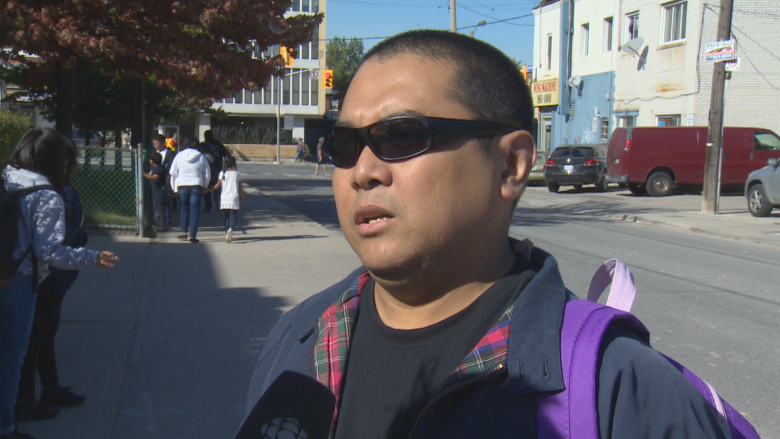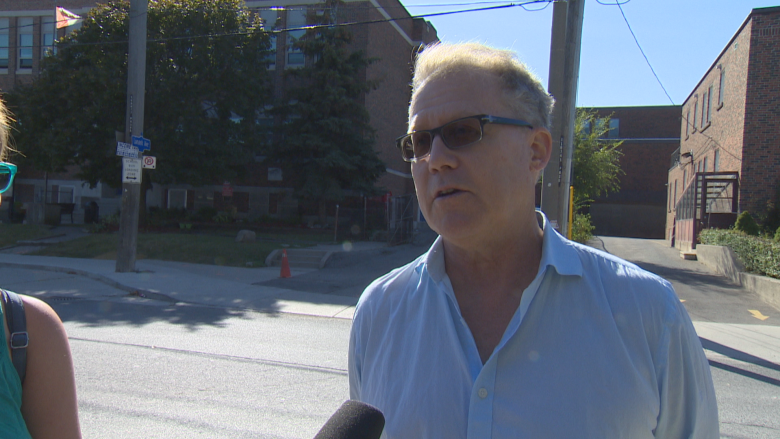Halfway house set to open beside Toronto elementary school
Parents of students at a Toronto Catholic elementary school say they've been caught off-guard after learning a halfway house for federal penitentiary inmates is about to open right beside their school.
About a dozen inmates will soon be housed on the second floor of the facility on Eglinton Avenue West overlooking St. Thomas Aquinas Elementary School. None of the parents or area residents canvassed by CBC News say they were told federal inmates are moving in next door.
"Of course, I am very much concerned about it," Dexter Costales said as he picked up his child from the school this week. He says parents should have been consulted — or at least notified by the city, the school board or corrections officials.
"When it comes to safety, kids should be the priority in our community and I think information and talking to the parents would be very, very important," he said.
The halfway house will help prisoners, whose crimes were deemed serious enough that they were handed prison sentences ranging from two years to life, re-integrate into society.
Community may not have known: school board
John Yan, a spokesperson for Toronto Catholic District School Board, confirmed with CBC News: "This is something this particular school community may not have known about."
The halfway house will be operated by the John Howard Society of the Toronto (JHST).
Yan says the JHST "does an amazing job of transferring people back into society." However, he said: "We would not have been notified directly by the John Howard Society or the city."
Land registry records show JHST bought the two-storey building in February 2013 for about $1.5 million. Since then, the organization has applied to the City of Toronto for variances and other permits to accommodate the prisoners.
In a series of emails, JHST spokesperson Sonya Spencer said: "The location of our building has been considered carefully and we will not offer accommodations to those we believe will in any way increase the risk to our neighbours, including students."
Spencer also said JHST "engaged our local councillor throughout the process."
Councillor not commenting
CBC News contacted local Ward 15 Coun. Josh Colle several times last week seeking comment or an interview about residents' concerns and the seeming lack of community consultation. Despite assurances he would speak with CBC News, he provided no information.
Local resident Justin Mright told CBC News, "I think we should have at least been informed. There could have been other solutions that wouldn't have riled everybody up."
Not everyone in the neighbourhood is opposed to the halfway house, however.
"These types of installations and these types of institutions have to go somewhere," said local resident Doug Banwell. Still, he too says he was never notified the inmates would be moving into the neighbourhood.
"How severe were the crimes they were convicted of? What steps are going to be taken to ensure they are properly supervised?"
Correctional Services Canada has not consulted the community either. But, in an email, spokesperson Kyle Lawlor maintained: "CSC promotes safe reintegration of offenders through risk assessment, community supervision, appropriate accommodation, and effective correctional programs and interventions."
CBC News has learned there are hundreds of federal inmates currently living in halfway houses in Toronto, including individuals convicted of murder and some under so-called LTSOs. Long-term supervision orders are placed on offenders deemed by the courts to be so dangerous they have to be supervised even after they have served the entirety of their penitentiary sentences.
Toronto most popular place for halfway houses
As it stands, Toronto seems to be the most common destination for male federal inmates being released into halfway houses for re-integration. Many aren't even from Toronto and have no family or roots here.
Toronto has about 14 such facilities. By comparison, Peel and Durham regions each have one halfway house for male inmates.
York Region has none.
The City of Toronto has no restrictions on placing these types of homes beside schools.
In 2014, the Committee of Adjustment's North York panel notified residents within a 60-metre radius of the Eglinton Avenue West facility that it was being asked to approve changes to the building. Those changes included reducing the number of required parking spots and converting second floor office space into residential units.
The public notice made no mention of federal inmates living there.
The JHST halfway house is to set open later this fall, although officials haven't provided a specific date.
John Lancaster can be reached at 416-205-7538 or at john.lancaster@cbc.ca





